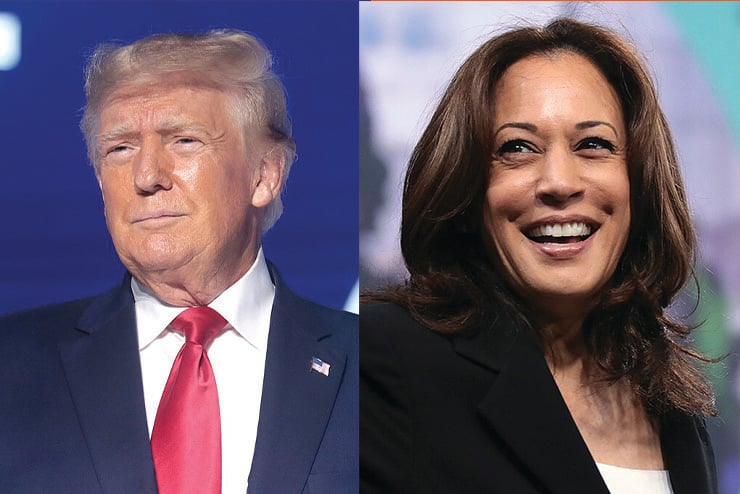Most partisans view elections as if they are self-contained and all-important moments in time. Winning the next election means success, pure and simple, while defeat is nothing less than catastrophic. These are the terms in which the major parties frame every presidential contest. Yet somehow when the bad guys win, the world goes on, and when the good guys win, the bad guys survive to imperil all that is right and just once again, a mere four years later.
A more realistic view of elections is that they are not just discrete, pivotal moments but segments of larger, continuous political systems. In concrete terms, a presidential victory usually also means midterm defeat for the president’s party. Every president of the post-Cold War era has lost the House in a midterm election: Bill Clinton did so in 1994, George W. Bush in 2006, Barack Obama in 2010, Donald Trump in 2018, and Joe Biden in 2022. Control of the Senate changes frequently as well, if not quite as predictably. And two-term presidents are typically not succeeded in office by a member of their own party.
What’s at stake in a presidential election is therefore something quite different from the all-or-nothing outcome that the rival campaigns habitually envision. Presidential elections do decide who gets to make judicial appointments, of course, including to the Supreme Court. They can also determine whether the country goes to war or not, depending on whether either party nominates someone who dissents from Washington’s pro-war consensus. These are important enough matters by themselves to justify the priority placed on presidential elections.
But even where courts are concerned, two further conditions are necessary for conservative success beyond the ability of a president to appoint the right people and a Senate inclined to confirm them. First, the right kind of jurist must be available—there must be a sufficiently deep talent pool from which a president can draw. Second, the states and the public at large must respond the right way to changes brought about by the courts.
The bitter lesson of the Supreme Court’s 2022 Dobbs decision is that ending Roe v. Wade doesn’t mean ending abortion, at least when voters even in red states insist on keeping it legal. The pro-life dream of appointing justices who will establish fetal personhood through a new reading of the 14th amendment also has little prospect of leading to the desired reality, if public opinion remains where it stands. Such an immediate success would lead to an equally swift backlash, like the one seen in response to Dobbs but larger, with the aim of passing another amendment to make abortion an explicit constitutional right.
Efforts in that direction are already afoot, of course, though for now, the “leave abortion to the states” position that Donald Trump has set forth seems to appeal to enough Americans to hold off attempts at writing abortion directly into the Constitution.
As for foreign policy, a good president can keep America out of unnecessary wars, but reforming America’s alliances, overseas commitments, and overall strategic posture will prove nearly impossible without a cooperative Congress and a fairly durable congressional consensus. A president can switch off the war machine during his tenure, but he can’t dismantle it, let alone rebuild it into something truly in the service of the national interest, without deep and long-lasting legislative support. Support on such a scale was available to the presidents who built America’s Cold War military and intelligence apparatus. Yet that was an historical anomaly, and nothing similar is at hand to allow these 20th-century institutions to be resurrected today.
Trump was an excellent foreign-policy president, and if reelected this November he will almost certainly be one again. But Trump himself continues to support Republicans who represent an establishment foreign-policy mentality, such as former Michigan congressman and now Senate candidate Mike Rogers. And, as with the courts, in matters of war and peace the work conservatives must perform extends far beyond electing the right president—necessary though that part of the task is.
In foreign and domestic policy alike, there is another element in play. Entropy is degrading our existing institutions, including the bad ones, and saps political capital and energy from new progressive projects as well as conservative ones. Mass immigration, for example, doesn’t simply expand the clientele for government services and identity politics, it also generates a political reaction, including among earlier immigrants, that prevents the left from fully realizing the potential gains from its policies. And while the foreign-policy establishment still succeeds at getting the U.S. into wars for the liberal international order, this success turns into failure for its own architects, as endless wars without victory give rise to stronger opposition to liberal internationalism itself.
The failure of progressive and liberal policies does not automatically make more Americans conservatives. It does, however, deplete the left of public confidence, which creates opportunities for the right—not necessarily a conservative right in the highest sense, but at least an anti-leftist counterforce.
The reality today may be that neither conservatives nor progressives can marshal enough persistent public support to carry out their programs. The days when America had the cohesion and morale for such undertakings are past.
Such days may return, but it will take more than an election to make America great again. At the moment, though, it’s a good place to start.

Leave a Reply